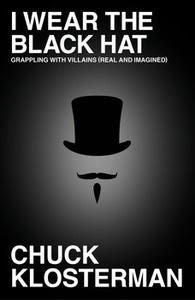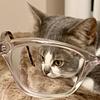Take a photo of a barcode or cover
"I rarely remember the names or faces of nonfictional people."
"I care about strangers when they're abstractions, but I feel almost nothing when they're literally in front of me. They seem like unnamed characters in a poorly written novel about myself, which was written poorly by me."
"It has always been my belief that people are remembered for the sum of their accomplishments but defined by their singular failure."
"Once, when asked to describe himself in one word, Gingrich said 'Cheerful,' which was the cognitive equivalent of 'Go fuck yourself for asking that question.'"
"The Constitution is awesome, but still overrated; it's like Pet Sounds. The wide-scale adoption of political correctness was silly, but not unreasonable. The freedom that was lost was mostly theoretical and rarely necessary."
"I care about strangers when they're abstractions, but I feel almost nothing when they're literally in front of me. They seem like unnamed characters in a poorly written novel about myself, which was written poorly by me."
"It has always been my belief that people are remembered for the sum of their accomplishments but defined by their singular failure."
"Once, when asked to describe himself in one word, Gingrich said 'Cheerful,' which was the cognitive equivalent of 'Go fuck yourself for asking that question.'"
"The Constitution is awesome, but still overrated; it's like Pet Sounds. The wide-scale adoption of political correctness was silly, but not unreasonable. The freedom that was lost was mostly theoretical and rarely necessary."
More like a 2.75.
One of the points is that anyone can be part villain, and considering that, I forgive some of the non sequiturs. But the whole "hated bands as villains" thing lost me. Never thought I'd feel sympathy for The Eagles because honestly, I haven't spent that much time thinking about The Eagles at all. But Chuck's Eagle-focused rage felt... kind of random.
I am also (unfairly) annoyed that the book ends at 80% because of the lengthy index. That always catches me off guard.
One of the points is that anyone can be part villain, and considering that, I forgive some of the non sequiturs. But the whole "hated bands as villains" thing lost me. Never thought I'd feel sympathy for The Eagles because honestly, I haven't spent that much time thinking about The Eagles at all. But Chuck's Eagle-focused rage felt... kind of random.
I am also (unfairly) annoyed that the book ends at 80% because of the lengthy index. That always catches me off guard.
Chuck's a lil' too far up his own asshole with this one. I've greatly enjoyed his previous non-fiction works, mostly because he hasn't tried to imbue his criticism of _pop_ ephemera with much in the way of greater meaning. It's pop culture, his books should be tasty little snacks that recall the specific period they are writing about, and that's it.
THIS collection of pop culture essays, though, has a theme. A rather muddled one about the nature of villainy and how our culture views its villains, with a healthy dash of self-chest-thumping "I always root for the bad guy, so I must be a bad guy" weirdness sprinkled throughout.
It just doesn't click on that level for me. Taken as a series of essays about various bad dudes from the last fifty years ago, it approaches a fun read. But the constant, tortured analysis of how each particular person fits into the grander theme of modern villainy ruins what little flow the book ever builds up.
Particularly annoying is the end. There is no grand wrap-up of the damned theme he's shoehorned in throughout the rest of the book, just a summary of the last person's particular villainy. And the last sentence is just the absolute worst.
Chuck's had a very solid track record on his career so far so a misstep was inevitable and I believe this is it. I hope he recovers and realizes that there's nothing wrong with being "just" a really outstanding pop culture essayist and decent novelist.
THIS collection of pop culture essays, though, has a theme. A rather muddled one about the nature of villainy and how our culture views its villains, with a healthy dash of self-chest-thumping "I always root for the bad guy, so I must be a bad guy" weirdness sprinkled throughout.
It just doesn't click on that level for me. Taken as a series of essays about various bad dudes from the last fifty years ago, it approaches a fun read. But the constant, tortured analysis of how each particular person fits into the grander theme of modern villainy ruins what little flow the book ever builds up.
Particularly annoying is the end. There is no grand wrap-up of the damned theme he's shoehorned in throughout the rest of the book, just a summary of the last person's particular villainy. And the last sentence is just the absolute worst.
Chuck's had a very solid track record on his career so far so a misstep was inevitable and I believe this is it. I hope he recovers and realizes that there's nothing wrong with being "just" a really outstanding pop culture essayist and decent novelist.
Klosterman is known as a sports writer, a pop culture writer, or the the Ethicist.
Whatever he is, he's a good writer that understand that critical analysis works best when the personal filter is acknowledged. He's able to go from the mundane to some pretty good intellectual analysis about evil and the banality of evil in comics, tv, and real life.
How do we, as a culture, decide someone is evil? Why do we root for the villain? What is the most villainous thing one can do? (Hint: it involves railroad tracks).
Taking on Bernard Goetz, OJ Simpson, Bill Clinton, Batman and many others, this is the kind of book that makes you laugh AND think.
Whatever he is, he's a good writer that understand that critical analysis works best when the personal filter is acknowledged. He's able to go from the mundane to some pretty good intellectual analysis about evil and the banality of evil in comics, tv, and real life.
How do we, as a culture, decide someone is evil? Why do we root for the villain? What is the most villainous thing one can do? (Hint: it involves railroad tracks).
Taking on Bernard Goetz, OJ Simpson, Bill Clinton, Batman and many others, this is the kind of book that makes you laugh AND think.
funny
informative
reflective
fast-paced
A highly engaging book that is at once informative, and entertaining.
Changed the way I consider villains, both real and fictional - which is definitely the mark of a great book. Will be seeking out Klosterman's other books.
Changed the way I consider villains, both real and fictional - which is definitely the mark of a great book. Will be seeking out Klosterman's other books.
Villains. Dichotomy. Batman. Pop culture. Good and evil.
I was really excited to read this book, but I think that was due to having a fundamental misconception on what the book was about. Because it's not really about the popular concept of villainy or the antihero (I think the word antihero was mentioned more on the book jacket than within the pages) from the 1970s to the present. I should say that this book will probably be enjoyable for men born in the 60s or 70s, but for a girl born in the late 90s it was a miss. It's not just the casual references to things I had to look up, but also the dismissive tone Klosterman seemed to take on whenever he wrote about women. He also had a tendency to state his own opinions as facts, with no support or explanation, which was very annoying because it made his following argument meaningless.
The final chapter begins with the statement: "writing about other people is a form of writing about oneself." Which I think is probably true, for most people at least. The problem is that it never seemed like Klosterman was writing about other people, instead it always seemed to be about himself, which is not the book I was looking to read.
All in all, the book was a quick read with many amusing references and quips. I wouldn't recommend it, but I don't regret reading it.
Also, I really wish Klosterman would use footnotes instead of bracketing his asides.
The final chapter begins with the statement: "writing about other people is a form of writing about oneself." Which I think is probably true, for most people at least. The problem is that it never seemed like Klosterman was writing about other people, instead it always seemed to be about himself, which is not the book I was looking to read.
All in all, the book was a quick read with many amusing references and quips. I wouldn't recommend it, but I don't regret reading it.
Also, I really wish Klosterman would use footnotes instead of bracketing his asides.
As someone who has long been obsessed with the villains of pop culture this was an interesting read. It was a little too sports centered for me, but I still highly enjoyed the book. My favorite chapter was probably the one on the Clinton affair.
I just love Chuck Klosterman's writing. The concept of this book - just, like, villains - is a very vague and open-ended theme, but I loved every essay in this book (except the one about Hitler).
What I love about Klosterman's writing is how much he just *knows*. Sure, he clearly does a lot of research and he knows how to craft a great argument from various sources. But what pushes him over the edge for me is how he throws in little pop-culture nods to all kinds of things and people from all eras. He consumes knowledge and culture unlike any other writer and presents it in such a compulsively readable way.
My favourite read so far of 2019.
What I love about Klosterman's writing is how much he just *knows*. Sure, he clearly does a lot of research and he knows how to craft a great argument from various sources. But what pushes him over the edge for me is how he throws in little pop-culture nods to all kinds of things and people from all eras. He consumes knowledge and culture unlike any other writer and presents it in such a compulsively readable way.
My favourite read so far of 2019.






